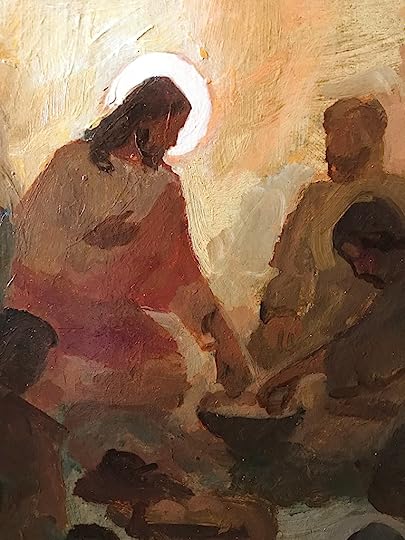In my last post, we discussed how the Twelve move from being disciples (students) to being Apostles (the sent) sent to be Jesus’ envoys. They are to go out like sheep among wolves to proclaim the same good news. And perform the same works of healing that he’s been doing.
Not only will they share his ministry, but they are to also share in his poverty, taking with them no money or extra clothing. They must depend solely on the hospitality of others for shelter and sustenance. Although Jesus endows them with some of his power, he also gives them this assurance, “Anyone who welcomes and accepts what you do welcomes and accepts me, and the One who sent me.” Much like it is today, one’s identity was tied to family and community. It was understood in the ancient world, that in showing hospitality, one welcomed not just an individual, but the community who sent the person and all that they represent. To welcome a disciple of Jesus would mean receiving the very presence of Jesus himself and of the one who sent him. This tells me that “how” we are welcomed is equally important as how we welcome others. The Apostles must go out and show compassionate welcome to all people, because in doing so they are showing compassion and hospitality to the one who sent them. This remains how the kingdom of heaven is ushered in, here and now. As part of the leadership team for the NACCC, I was kept very busy – moving between meetings and lectures. The day after the conference started, I was rushing to catch the elevator, and ran into a woman who looked a little rushed herself. She had a similar badge around her neck like mine, but hers was yellow. Meaning she was, like Rev. Bob, a first timer to our conference. Instead of listening to the voice in my head that just wanted to spend a few seconds alone on the elevator in quiet, I followed the voice of my heart that turned to welcome her. The conversation wasn’t profound, but the presence of Christ surely was. The presence of his peace seemed to calm us both in our busyness. She later told me that she arrived a day late to the conference, because her flight out of Boston got thrown out of whack by the storms that were pounding the east coast. After enduring a 20-hour travel nightmare, that one kind gesture from a stranger helped her feel welcomed and accepted. While I can’t recall what we talked about at the elevator, I can remember the smiles we both walked away with. That’s what happens, right? With one act of kindness, two people are affected. That’s how the kingdom of heaven comes near. Big or small, any act of compassionate welcome is a form of serving Christ. And welcoming him into whatever space we are in. It should be of no surprise that compassion is always first felt in the heart. This is where God planted Christ, the Divine Image of God, in us. To bear the image and likeness of God is to be like little Christs, proclaiming God’s glory in our relationships with God and with others. Paul reminds us that we share the same mind that was in Christ Jesus (Philippians 2:5). But do we have the same will to welcome and serve others in love as he did? When you pass by people, do you see a stranger, or the divine image of God? St. Theresa of Calcutta believed that in seeing the image of God in the other is to see others with the eyes and heart of Jesus. When Christ is all we see, our brothers and sisters, our friends, enemies, neighbors, and strangers alike, all become him. Just as we welcome them, we also welcome him. And the One who sent him.
Whether or not Colleen saw this man as made in the same divine image as her isn’t really the point. She saw another with the eyes of a compassionate heart and allowed God to move through her to act.
It doesn't take much to proclaim the gospel. A simple text message to check in with a friend who is going through a difficult time. Or a random act of kindness to a stranger without expecting anything in return. When we notice God in the other, and move to honor God in that person, the kingdom of heaven is ushered in. And our reward is full. Everything we do can be a holy act by taking the love and compassion you have for someone you care for and giving it to someone you don’t. Our job is not to “save” them or make them one of us because they are already one of us, one of God’s. Our job is to love them because in that love we are loving the Christ in them. Jesus sends us to proclaim the good news - that heaven has come here. I take that to mean that this space we call Anamesa is filled with the divine presence of heaven. Which means there are plenty of opportunities for us to welcome Christ. To see the divine all around us means to honor it - not with violence and war, but with love and compassion. If we can see Christ in everyone, then we might be more inclined to guard everyone’s dignity, nurse every wound, protect the rights of every beloved child of God. Jesus made it abundantly clear that salvation is intimately tied to how we embrace and honor this divine image in one another, especially those who are most vulnerable among us. In the last parable he taught, the parable of the sheep and goats (Matthew 25:31-46), Jesus said the way we treat one another is, ultimately, representative of our response toward him. He said, “Just as you did to the least of these your brothers and sisters, you did it to me.” Giving water to the thirsty, food to the hungry, justice to those who are oppressed and imprisoned. These are the greatest forms of worship we can offer God because we’re doing them directly to God. Compassion is not just a feeling or a state of mind. It’s an action. One which calls us to lay aside our personal comforts to meet the needs of others. This is what it means to love God, love others, and serve both. Jesus sends us to meet people where they are. And shows us how to use our own experiences as keys that unlock the door of our heart, so God’s love, grace, and mercy can flow freely through us. Jesus sends us into Anamesa, that space between our brothers and sisters, to meet those crying out and allow the constant flow of God’s love to alleviate their suffering. It doesn't have to be a grand heroic act. You don’t have to put yourself in harm’s way. Jesus said it can be as simple as giving someone a drink of cold water. The real gift they are receiving isn’t us, but Christ himself and the One who sent him. Work Cited Thank you to Rev. Ole Skjerbæk Madsen at christfulness.net for his words of inspiration on compassionate welcome. Adapted from The Smallest of Acts by Ian Macdonald on June 28, 2020, at jesusnotjesus.org. (accessed on June 29, 2023) Bartlett, David L and Barbara Brown Taylor, eds. Feasting on the Word, Year A, Vol 3. Louisville: Westminster John Knox, 2011.
0 Comments
Leave a Reply. |
Ian MacdonaldAn ex-copywriter turned punk rock pastor and peacemaker who dedicates his life to making the world a better place for all humanity. "that they all might be one" ~John 17:21“Prius vita quam doctrina.”
~ St. Thomas Aquinas (1225–1274) * “Life is more important than doctrine.”
Archives
June 2024
|

